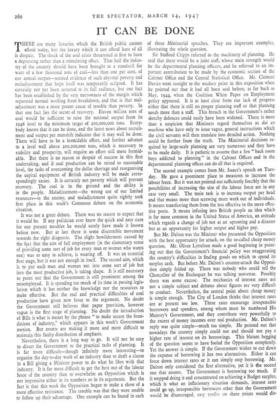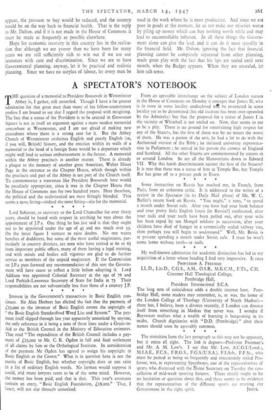IT CAN BE DONE T HERE are many luxuries which the
British public cannot .1 afford today, but the luxury which it can afford least of all is despair. The shock of the coal crisis threatened at first to have a depressing rather than a stimulating effect. That half the indus- try of the country should have been brought to a standstill for want of a few thousand tons of coal—less than one per cent. of our annual output—seemed evidence of such abysmal poverty and maladjustment that hope itself was temporarily eclipsed. It has certainly not yet been restored to its full radiance, but one fact has been established by the very narrowness of the margin which separated normal working from breakdown, and that is that mal- adjustment was a more potent cause of trouble than poverty. In that one fact lies the secret of recovery. Eleven million tons of coal would be sufficient to raise the national output from its 1946 level to the minimum target of 200,000,000 tons. Every- body knows that it can be done, and the latest news about recruit- ment and output per manshift indicates that it may well be done. There will have to be a formidable effort, and further advance to a level well above 200,000,000 tons, which is necessary to stability and prosperity, will require an effort still more formid- able. But there is no reason to despair of success in this first undertaking, and if coal production can be raised to reasonable level, the tasks of overcoming the dollar shortage and reorganising the capital equipment of British industry will be made corre- spondingly easier. It is certainly not poverty which will prevent recovery. The coal is in the ground and the ability is in the people. Maladjustment—the wrong use of our limited resources—is the enemy, and maladjustment quite rightly took first place in this week's Commons debate on the economic situation.
It was not a great debate. There was no reason to expect that it would be. If any politician ever knew the quick and easy cure for our present troubles he would surely have made it known before now. But at last there is some discernible movement towards the right diagnosis. The slight bewilderment caused by the fact that the aim of full employment (in the elementary sense of providing some sort of job for every man or woman who wants one) was so easy to achieve, is wearing off. It was an essential first stage, but it was not enough in itself. The second aim, which is to put each man and woman not into some sort of job but into the most productive job, is taking shape. It is still necessary to point out that the Government is still prominent among the misemployed. It is spending too much of its time in passing legis- lation which it has neither the knowledge nor the resources to make effective. But the real and practical difficulties of coal production have given new force to the argument. No doubt the Government still believes that paper provision, however vague is the first stage of planning. No doubt the introduction of Bills is what is meant by the phrase "to make secure the foun- dations of industry," which appears in this week's Government motion. But events are making it more and more difficult to maintain this faulty distribution of emphasis.
Nevertheless, there is a long way to go. It will not be easy to direct the Government to the practical tasks of planning. It is far more difficult—though infinitely more interesting—to organise the day-to-day work of an industry than to draft a clause in a Bill giving a Minister power to do what he likes with that industry. It is far more difficult to get the best out of the labour force of the country than to overwhelm an Opposition which is not impressive either in its numbers or in its arguments. But the fact is that this week the Opposition began to make a show of a more effective resistance. The trouble was that they were unable to follow up their advantage, One example can be found in each of three Ministerial speeches. They are important examples, illustrating the whole question.
.Sir Stafford Cripps referred to the machinery of planning. He said that there would be a joint staff, whose main strength would be the departmental planning officers, and he referred to an im- portant contribution to be made by the economic section of the Cabinet Office and the Central Statistical Office. Mr. Clement Davies went straight to the weakest point in this exposition when he pointed out that it had all been said before, as far back as May, 1944, when the Coalition White Paper on Employment policy appeared. It is at least clear from our lack of progress either that there is still no proper planning staff or that planning needs more than a staff. This breach in the Government's rather sketchy defences could easily have been widened. There is more than a suspicion that Ministers regard themselves as dei ex machina who have only to issue vague, general instructions which the civil servants will then translate into detailed action. Nothing could be further from the truth. The Ministerial decisions re- quired by large-scale planning are very numerous and they have to be made daily. It is pathetic to assume that a few "back room boys addicted to planning" in the Cabinet Offices and in the departmental planning offices can do all that is required.
The second example comes from Mr. Isaacs's speech on Tues- day. He gave a prominent place to measures to increase the labour force. But it was not pointed out sufficiently forcibly that the possibilities of increasing the size of the labour force are in any case very small. The main task is to increase output per head and that means more than screwing more work out of individuals. It means transferring them from the less effective to the more effec- tive posts. It means infusing into British people an idea which is far more common in the United States of America, an attitude which regards a change of job not as an uprooting and a disaster but as an opportunity for higher output and higher pay.
But Mr. Dalton was the Minister who presented the Opposition with the best opportunity for attack, on the so-called cheap money question. Mr. Oliver Lyttelton made a good beginning in point- ing out that the Government's financial policy was exaggerating the country's difficulties in finding goods on which to spend its surplus cash. But before Mr. Dalton's counter-attack the Opposi- tion simply folded up. There was nobody who could tell the Chancellor of the Exchequer he was talking nonsense. Possibly there was some excuse. The mechanics of interest rates are not a simple subject and debates about figures are very difficult to conduct. Nevertheless, the central point about cheap money is simple enough. The City of London thinks that interest rates are at present too low., These rates encourage irresponsible borrowers and spenders, among whom must be numbered His Majesty's Government, and they contribute very powerfully to the excess of money incomes over real production. Mr. Dalton's reply was quite simple—much too simple. He pointed out that nowadays the country simply could not and should not pay a higher rate of interest on its borrowings. This blatant begging of the question seems to have fooled the Opposition completely. Yet the answer is simple. If the Government wishes to cut down the expense of borrowing it has two alternatives. Either it can force down interest rates or it can simply stop borrowing. Mr. Dalton only considered the first alternative, yet it is the second one that counts. The Government is borrowing too much. If it stopped doing it and concentrated on achieving a Budget surplus, which is what an inflationary situation demands, interest rates could go up, irresponsible borrowers other than the Government would be discouraged, easy profits on share prices would dis- appear, the pressure to buy would be reduced, and the country would be on the way back to _financial health. That is the reply to Mr. Dalton, and if it is not made in the House of Commons it must be made as frequently as possible elsewhere.
Hope for economic recovery in this country lies in the realisa- tion that although we are poorer than we have been for many years we are still sufficiently rich to win out if we use our resources with care and discrimination. Since we are to have Governmental planning, anyway, let it be practical and realistic planning. Since we have no surplus of labour, let every man be used in the work where- he is most productive. And since we are poor in goods at the moment, let us not make our miseries worse by piling up money which can buy nothing worth while and may lead to uncontrollable inflation. In all these things the Govern- ment alone can give the lead, and it can do it most speedily in the financial field. Mr. Dalton, ignoring the fact that financial planning cannot be completely separated from other planning, made great play with the fact that his lips are sealed until next month, when the Budget appears. When they are unsealed, let him talk sense.



































 Previous page
Previous page